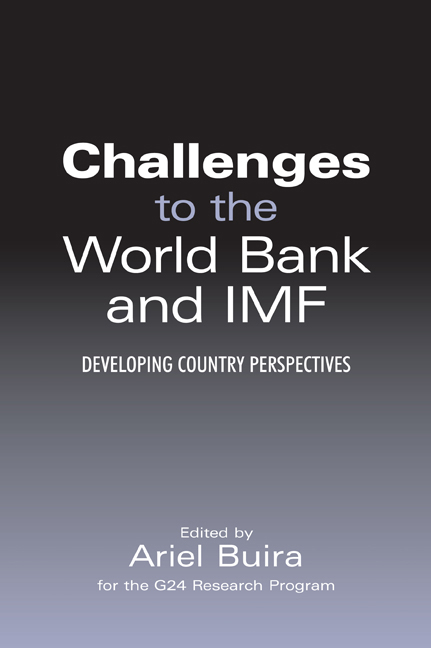Book contents
- Frontmatter
- Contents
- Contributors to this volume
- Foreword
- Introduction
- 1 The Governance of the IMF in a Global Economy
- 2 Who pays for the IMF?
- 3 An Analysis of IMF Conditionality
- 4 Achieving Long-Term Debt Sustainability in Heavily Indebted Poor Countries (HIPCs)
- 5 The Poverty Reduction Strategy Paper Approach: Good Marketing or Good Policy?
- 6 Capital Management Techniques in Developing Countries
- 7 International Reserves to Short-Term External Debt as an Indicator of External Vulnerability: The Experience of Mexico and Other Emerging Economies
- 8 Mechanisms for Dialogue and Debt-Crisis Workout that Can Strengthen Sovereign Lending to Developing Countries
- 9 Developing a Global Partnership for Development
- 10 International Financial Institutions and International Public Goods: Operational Implications for the World Bank
- Index
Introduction
Published online by Cambridge University Press: 10 September 2020
- Frontmatter
- Contents
- Contributors to this volume
- Foreword
- Introduction
- 1 The Governance of the IMF in a Global Economy
- 2 Who pays for the IMF?
- 3 An Analysis of IMF Conditionality
- 4 Achieving Long-Term Debt Sustainability in Heavily Indebted Poor Countries (HIPCs)
- 5 The Poverty Reduction Strategy Paper Approach: Good Marketing or Good Policy?
- 6 Capital Management Techniques in Developing Countries
- 7 International Reserves to Short-Term External Debt as an Indicator of External Vulnerability: The Experience of Mexico and Other Emerging Economies
- 8 Mechanisms for Dialogue and Debt-Crisis Workout that Can Strengthen Sovereign Lending to Developing Countries
- 9 Developing a Global Partnership for Development
- 10 International Financial Institutions and International Public Goods: Operational Implications for the World Bank
- Index
Summary
In trying to find their way toward growth and economic and social development, policymakers in developing countries face multiple uncertainties. For most, the major sources of advice of external financial assistance are the Bretton Woods institutions. With large financial resources at their disposal, and their support conditional on the adoption of certain policy prescriptions, the influence of the International Monetary Fund (IMF) and the World Bank (WB) can hardly be exaggerated.
Their influence on economic policy has undoubtedly contributed to the strengthening of the macroeconomic framework of member countries, reducing public sector deficits and public debt accumulation, improving monetary control and reducing the distortions and misallocation of resources brought about by high rates of inflation. In addition, by fostering trade liberalization and privatization of state enterprises, the Bretton Woods Institutions (BWIs) have generally contributed to the growth of exports and the attraction of foreign direct investment. In the face of a number of recent challenges, however, these institutions’ neoliberal paradigm would seem insufficient, and needs to be complemented by other elements.
The first of these challenges is posed by the explosive growth of capital markets and their extraordinary volatility, with the consequent potential for the emergence of multiple equilibria in exchange markets – and also for devastating financial crises. While the BWIs recognize these risks, and are trying to improve their capabilities to predict crisis, efforts at crisis prevention have not been successful. As for crisis resolution, the IMF's approaches to in Asia, Russia and Argentina have been controversial. In fact, one of the more successful responses to the challenge posed by the volatility of capital flows has been the introduction in Chile and Colombia, for example, of market-based controls on capital movements, which had been resisted by the IMF for years. These responses illustrate the practical relevance of the ‘theory of the second best’ by which, when an economy suffers a distortion, welfare may be improved by the judicious introduction of another distortion through some form of government intervention.
A second, related, challenge, which is yet to be addressed, is posed by the massive reversals of previously large capital flows, from the developed to the developing countries.
- Type
- Chapter
- Information
- Challenges to the World Bank and IMFDeveloping Country Perspectives, pp. 1 - 12Publisher: Anthem PressPrint publication year: 2003



